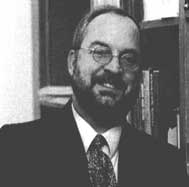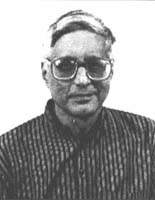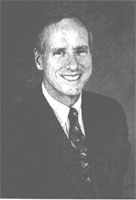|
The 2nd annual Sardar Patel Award
was held on December 2nd, 2001 at the Anaheim Sheraton. The winner was Dr. David Stuligross and his
dissertation.

Dr. David Stuligross
2001 Award Ceremony:
Abstract of Dissertation
Ceremony Program
Keynote Speakers
Letter from the Chairman of FSPAA
Letter from the UCLA History Chair
"A Piece of Land to
Call One's Own:
Multicultural Federalism and Institutional Innovation in
India"
A Piece of Land to Call One’s Own: Multicultural Federalism and Institutional Innovation in India.
This dissertation addresses two questions. First, why do some political communities seek federal statehood rather
than substantive accommodations within existing state legislatures? Under specified conditions in federal
systems, state governments may systematically neglect regions within states. Both the government policy and the
statehood demand are rationally self-defeating. Statehood demands receive their clearest support when aimed
against the existing state government, but potential for institutional or substantive accommodation are greatest
when the national government is brought directly into the political debate.
Second, why, how, and when is culture used as a frame for social mobilization to achieve these ends? Culture plays
two roles. First, social movement leaders can and do claim that communities are neglected or
exploited for reasons of cultural difference. For example, successive governments in Bihar, regardless of party,
neglected the Jharkhand region-including people of all communities-but that data did not diminish
the resonance of tribal leaders’ claims. Second, Indian political institutions provide special access to some kinds of
cultural communities. Scheduled tribes, scheduled castes, and linguistic communities have been
given preferential access. Distributional conflicts that may have been framed in a variety of other ways are instead
framed in terms of “tribal rights.” The choice of political frame is important because it shapes the
range of possible governmental responses at both the state and national levels.
Masters of Ceremony
Jyoti Solanki
Reception
4:30 p.m. to 5:30 p.m.
Entertainment
5:30 p.m. to 6:40 p.m.
Lighting of Lamp by Hamilton Brewart
U.S. National Anthem by The Boy Scouts of America, Troop 358, San Marino
Indian National Anthem by Arvind Joshi
Sardar Patel audio/video Program presentations by Vikram Kamdar
Entertainment Program by Sarita Vasa
Award Ceremony
6:40 p.m. to 8:00 p.m.
Welcome by Jitendra Mehta
Introduction of Rajmohan Gandhi by Navin Doshi
Keynote Address by Rajmohan Gandhi
Consulate General of India by Ambassador Shri Viswanathan
Dean of Social Sciences Dep. UCLA by Dr. Scott Waugh
Award criteria and introduction of committee by Dr. D. R. SarDesai
Presentation of Award by Ukabhai and Nalini Solanki
Acceptance of Award by David Stuligross
Donation to Red Cross by Big Saver Foods
Dinner
8:00 p.m. to 9:30 p.m.

Rajmohan Gandhi
Born 1935 in New Delhi. Author, commentator, and Visiting Professor.
Member, International Council of Initiatives of Change (formerly known
as Moral Re-Armament); Trustee, Friends of Moral Re-Armament (India)
Current positions: Visiting Professor in History for Fall
2001, UCLA.
Initiator and co-chair, Centre for Dialogue and Reconciliation, New
Delhi.
Jury member, Nuremburg Human
Rights Award.
Some previous positions:
Visiting Professor in History and Political Science, University of
Illinois, 1997, 1999 & 2001.
Emory University, Atlanta, 2000.
Obirin
University, Tokyo, 1997.
George Mason University,
Fairfax, Virginia, 1996.
Professor, Centre for Policy Research, New Delhi, 1992-2000
Member of the Rajya Sabha, the Indian Upper House, 1990-1992.
Convener,
Joint Parliamentary Committee of both Houses for the Scheduled Castes and Tribes, 1990-92.
Leader, Indian Delegation, UN Human Rights Commission, Geneva, 1990.
Editor, Indian Express, Chennai (Madras), 1985-87.
Fellow, Woodrow Wilson
Center for Scholars, Washington DC, 1984-5. Member of the Press Council of India, 1982-84.
Chief Editor, Himmat Weekly, Mumbai (Bombay), 1964-81.
Honors received
include Honorary Doctor of Laws, University of Calgary, Alberta, 1997.
Honorary Doctor of Philosophy, Obirin
University, Tokyo, 1997.
Honorary Professorship, University of Osh, Kyrgyz Republic,
1996.
Books published include:
Revenge and Reconciliation: Understanding South
Asian History, Penguin, New Delhi, 1999.
Rajaji: A Life (biography of Chakravarti Rajagopalachari,
1878-1972, Governor-General of India, 1948-1950), Penguin, New Delhi,
1997.
The Good Boatman: A Portrait of
Gandhi, Viking, New Delhi, 1995.
Patel: A Life (biography of Vallabhbhai Patel, 1875-1950, Deputy Prime Minister of India, 1947-1950),
Navajivan, Ahmedabad, 1990.
Understanding the Muslim Mind,
Penguin, New Delhi, 1987.

Scott L. Waugh
Scott L. Waugh is the Dean of Social Sciences at UCLA. As dean, he is
responsible for the leadership of some of UCLA’s largest and highest-ranked departments, including
anthropology, economics, geography, history, political science, sociology, communication studies, ethnic
studies, chicana/chicano studies, women’s studies, and ROTC programs. Nearly half the undergraduate degrees awarded
by UCLA each year are awarded in the Social Sciences. Also reporting to Waugh are three
interdisciplinary research centers: the Center for the Study of Women, the Cotsen Institute of Archaeology, and the
Institute for Social Science Research.
Waugh graduated summa cum laude in history from UCLA in 1970. He earned
his doctorate in English History from the University of London. A member of the UCLA faculty since
1975 in the Department of History, he has held a number of leadership positions at the university,
including the chair of the Department of History and chair of the Council on Educational Development.
Waugh has received numerous honors and fellowships including two grants
from the National Endowment for the Humanities and the UC President’s Fellowship in the
Humanities. He has also been the recipient of one of UCLA’s highest honors, The Distinguished Teaching
Award. Among his many publications on Medieval English History are the books: The Lordship of England
(Princeton, 1988), England in the Reign of Edward III (Cambridge, 1991), and Christendom and Its
Discontents (Cambridge, 1996, Editor).
Dear friends,
This year we are celebrating the presentation of Second Sardar
Patel Dissertation award Facilitated by Friends of Sardar Patel Association.
I am extremely delighted to hear from the Evaluation Committee that they
have unanimously designated Dr. David Stuligross as the winner of this
prestigious award. We extend our heartiest congratulation to Dr. David
Stiligross for being selected to receive this prestigious award. The title
of his dissertation for which he received the Ph.D. degree from a highly
rated University of California Berkely in the current year 2001 is “A piece of
Land to Call One’s Own” (this refers to newly created state of Jharkhand in
India).
We record with gratification that the creation of the Sardar Patel Endowment
at UCLA has generated tremendous excitement among the students of various
universities all over America to contest the annual award. We feel very
proud of such a wonderful accomplishment. It encourages us to concentrate
all our efforts more aggressively to circulate our message reaching to each and
every prospective participant. We do appreciate the valuable cooperation
offered by the department of history at UCLA.
Our sincerest thanks to our chief adviser Dr. D.R. SarDesai, Emeritus
Professor of History at UCLA and chair of the Sardar Patel Dissertation
Award Evaluation Committee and the esteemed members of the Committee who
have amazingly scrutinized hundreds of pages of materials leading to the
selection of the award winner.
It is my earnest desire to develop a center at UCLA providing rich cultural
heritage of India which include Arts, Music, Dance and Literature.
Sincerely,
Lalchand Gaglani
SARDAR PATEL DISSERTATION AWARD
From its Establishment to the Present
On
October 31, 1999, the 124th birth anniversary of Bharat Ratna Sardar Vallabhbhai
Patel, an endowment of $250,000 was pledged to UCLA (it was fully redeemed
a year later) by the Friends of Sardar Patel Award Association of Los
Angeles to enable the establishment of an annual award of $10,000 for the best
Ph.D. dissertation on Modern India in Social Sciences, Humanities,
Education and Fine Arts completed at any U.S. university in the previous
year. The award, to be administered by UCLA's History Department would honor the
memory of the one of the greatest sons of India, Sardar Vallabhbhai Patel,
who along with Mahatma Gandhi and Jawaharlal Nehru, constituted the
triumvirate that was primarily responsible for the advent of India's
independence in 1947. The Sardar was truly the architect of Modern India as
a political entity being the pivotal force behind the integration of over
500 princely states, without which we might truthfully say, there would be no
India as a state we have known in the last half century. It may be added
that as of this date, there is no doctoral dissertation award of this
magnitude in the United States in any of the academic fields mentioned above.
The Sardar Patel Dissertation Award is expected to raise the level of
academic discourse on Modern India in the United States. The winners of the
award will be called Sardar Patel Scholars, who would signify distinct
scholarly merit and intellectual excellence in Indian Studies in this
country.
The establishment of the Award on October 31, 1999 was marked by a banquet
for 600 persons drawn from UCLA's academic community, donors to the Sardar
Patel Dissertation Award Endowment, and other prominent members of the
Indian-American community. On that day, there was a screening of the feature
movie, Sardar, directed by Ketan Mehta, an exhibition of photographs
depicting the life of Sardar Patel and an inspiring address by Rajmohan
Gandhi, grandson of Mahatma Gandhi and of Chakravarti Rajagopalachari (Rajaji)
and distinguished author of the definitive biography of Sardar Patel.
The first Sardar Patel Dissertation Award was conferred on Dr. Srirupa Roy,
Assistant Professor of Political Science at the University of Massachusetts
at Amherst by Navin and Pratima Doshi, donors of the Doshi Chair at UCLA in
the distinguished presence of Shri Inder Kumar Gujral, former Prime Minister of
India. at a banquet attended by over 400 persons at the Sheraton Anaheim on
October 29, 2000. Dr Roy completed her Ph.D. at the University of
Pennsylvania on "Divided We Stand: Diversity and National Identity in India,"
under the able supervision of Professor Ian S. Lustick.
And now, on December 2, 2001, we meet to honor Dr. David Stuligross,
presently Assistant Professor of Peace Studies at Colgate University, as the
winner of the Sardar Patel Dissertation Award for the year 2001 for his
doctoral dissertation on ""A Piece of Land to Call One's Own: Ethnic Federalism
and Institutional Innovation in India." This work on the emergence of
Jharkhand as one of the three new states in India was completed in the
Political Science Department of the University of California at Berkeley under
the esteemed guidance of Professor Jyotirindra Das Gupta .
UCLA's Department of History, the Friends of Sardar Patel Award Association
and the Indian-American community of Southern California supporting the
activity, warmly congratulate Dr. DAVID STULIGROSS as the new SARDAR PATEL
SCHOLAR. May the high level of his scholarship inspire generations of doctoral
students across the U.S. to perpetuate the study of India in the
consciousness of this great nation. May the work of the Sardar Patel
Scholars blaze the trail for successive winners of this prestigious award for
all times to come.
D.R.SarDesai
Chair, Sardar Patel Dissertation Awards Committee, UCLA
|